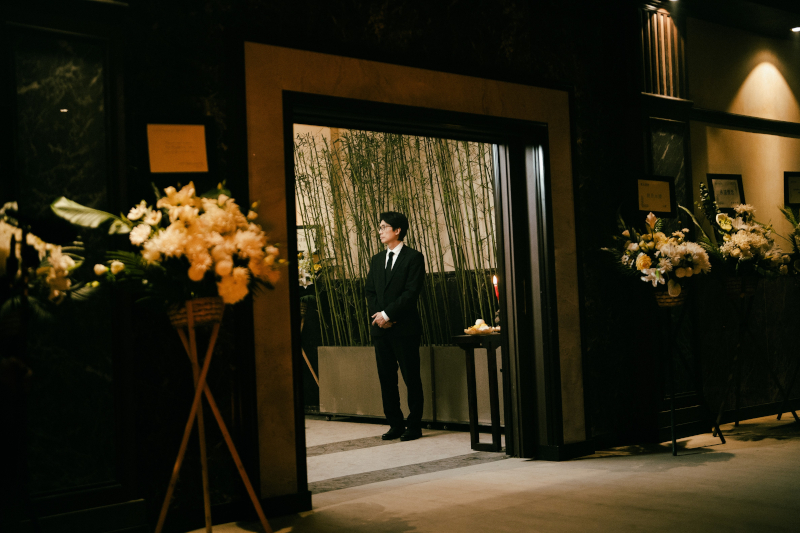Director – Anselm Chan – 2024 – Hong Kong – Cert. 12a – 130m (extended version – Cert. 15 – 140m)
**** (regular version) / unseen (extended version)
A failed, professional wedding planner joins a Taoist funeral director as a partner in his company as various crises come to a head in the latter’s family – engaging drama is back out in UK cinemas in an extended version on Friday, April 24th following the original version’s release on Friday, November 15th 2024
There have been movies about undertakers and funeral parlours before, but never one quite like this. Whether or not one is at a stage in life where one has had much experience of bereavement, at some point, each one of us is going to die – and, before that, in all likelihood, have to deal with our nearest and dearest dying and, by extension, undertakers and funeral directors in whatever culture we happen to live. Consequently, there is a universal fascination with such matters.
Hong Kong has a very specific cultural take on this phenomenon in its Taoist priests and rituals. While these have over the years supplied the basis for much beloved and fantastical Hong Kong action or horror fare such as Zu Warriors From the Magic Mountain (Tsui Hark, 1983) or the Mr. Vampire films (1985 onwards), no-one has ever tried to build a contemporary, generational family drama around the Hong Kong funeral business, at least, not so far as I’m aware.
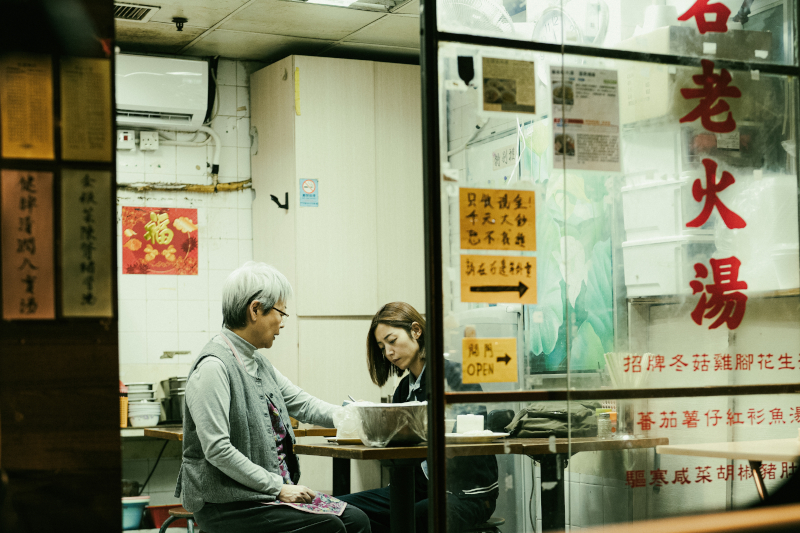
The Last Dance pitches the viewer straight in to this unfamiliar world through failing professional wedding planner Dominic (Dayo Wong), whose girlfriend Jane (Catherine Chau) is the niece of retiring funeral parlour owner Ming (Paul Chun) and has recommended Dom as a possible successor to Ming’s aging business partner and fellow funeral director Man Kwok (Michael Hui). “Master Man”, as everyone calls him, is a traditionalist who has inherited his father’s Taoist funeral parlour business and is widely respected in the limited, male-oriented circles of the Taoist funeral parlour business.
Yet, Master Man struggles with his know grown-up kids, who also have their own demons to fight. Mandy, the wife of son Ben (Tommy Chu) is a Catholic who wants to get their small son into Catholic school and has Ben attending baptismal class, something he does out of a sense of duty to his family even though it conflicts with the Taoist beliefs his father and family hold dear and of which he is a robed practitioner at the parlour. Man doesn’t consider Ben to be fit for the job of Taoist priest, a situation which causes Ben some quite considerable psychological pain.
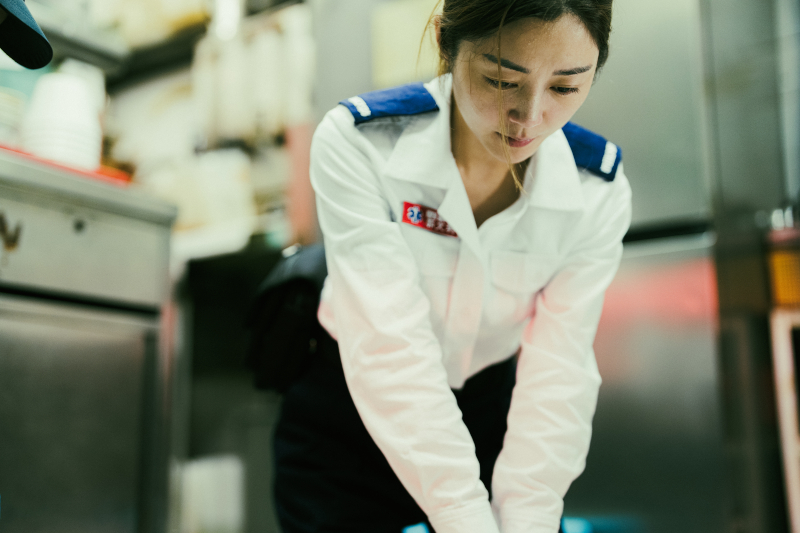
Daughter Yuet (Michelle Wai) is an ambulance paramedic given to working out her grief – from unavoidably losing patients – via casual sex with co-worker and fellow smoker On (Thor Lok), who would perhaps like their relationship to extend beyond the physical into something more permanent. She uses him, and yet at the same time he is a trusted colleague. Her relationship with her father is difficult, since he considers women ritually unclean because of menstruation, and thereby unable to legitimately perform the Taoist rituals she has witnessed him execute from childhood. Man’s wife, her mother, died a long time ago, before the narrative begins, and she finds something of a surrogate mother figure in Lin (Elaine Jin), a local shopkeeper with a strong sense of community who looks out for many local people.
Death (closely followed by its companion, bereavement) is never far away from the Kwok family business, nor from Yuet’s chosen profession (perhaps this is part of the reason she chose to be a paramedic). It seeps into the narrative in the first instance both via the funeral parlour’s assorted, bereaved clients and some of Yuet’s patients and in the second as various characters, including Lin fairly early on, die of old age. While some viewers might consider action or horror outings to push the boundaries of cinema more, this is not a film afraid to confront the taboo subjects of death and dying.
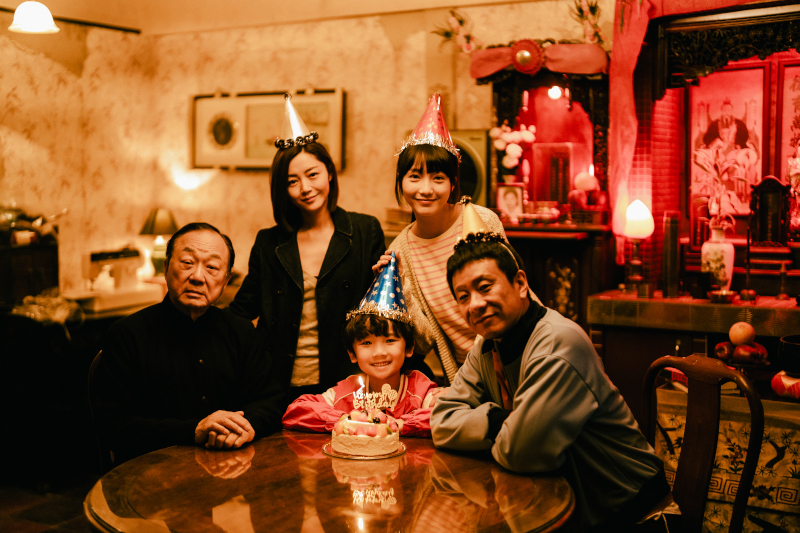
Some of the bereavement sequences are achieved by visual montages to incidental music bordering on the sentimental and heart-tugging, yet somehow that seems not to matter, instead proving highly effective. Anselm Chan’s screenwriting – or perhaps his direction – has a tendency to go off at a tangent into a host of interesting subplots, the film consequently feeling at times as if it can’t make up its mind about following the main story about Dominic and Man Kwok when there are so many other stories in the plot’s satellite characters crying out to be told with equal emphasis. That’s a shame, actually, because the story of those two primary characters is a rich one pregnant with considerable potential which really doesn’t need to be broken up by further subplots.
In addition to the son and daughter subplots, we are also served episodes about a woman who has been largely shunned by other funeral directors as crazy and a bereaved husband who doesn’t want a woman he disliked anywhere near his wife’s corpse woman (the reason is never explained). Anselm Chan can’t resist throwing in another about Dom’s girlfriend becoming pregnant when he doesn’t want kids. The piece sometimes feels like it would be better off as a TV miniseries, where some of these episodes could be explored at greater length than is possible within the confines of a feature. And yet, contradictorily, it does feel like a genuine, big screen movie.
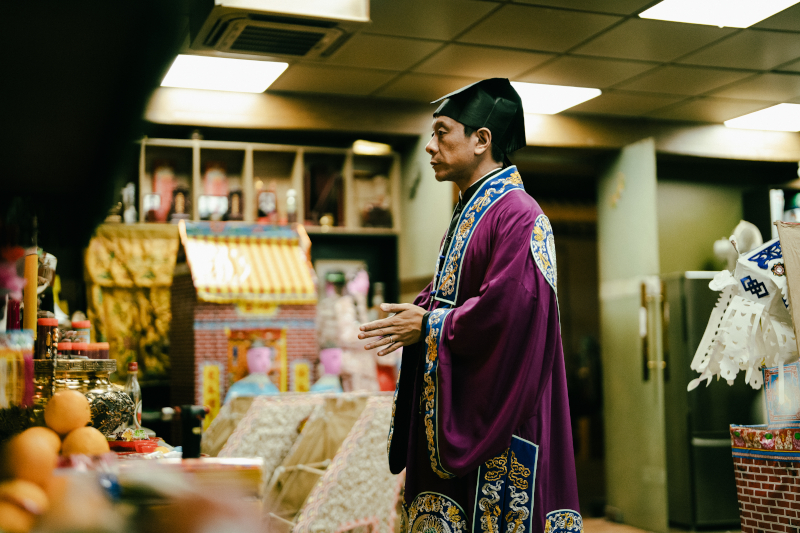
The film has an ace up its sleeve in its putting Taoist ritual on the screen, particularly in the extended sequence performed by the two Kwok siblings towards the end. At the centre of all this is the ritual of Breaking Hell’s Gates, to do with priests charging into Hell with a fiery sword to allow a deceased soul to pass through and reincarnate rather than becoming trapped in Hell. Fascinating stuff.
The overall whole seems to be about people (sometimes) coming to terms with their own shortcomings, and forgiveness, particularly between family members with differing points of view where there has been bad blood for years. That’s ironic given that one of the subplot is (to borrow an image from Hong Kong action movies) a Mexican stand-off, here between two religious systems – Catholicism from the West and Taoism from nearer to home. Still, if you want to find out more about how Hong Kong does death, in the sense of dying and funerals and so forth, this film is not a bad place to start. Despite its two hours plus running length, it will hold your attention throughout.
The Last Dance is back out in UK cinemas in an extended version on Friday, April 24th following the original version’s release on Friday, November 15th 2024.
Trailer:
Trailer (extended version):
